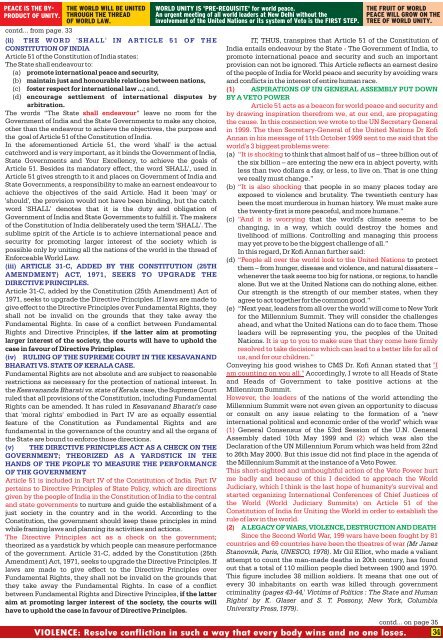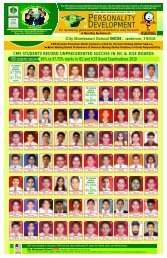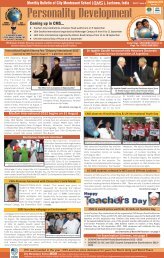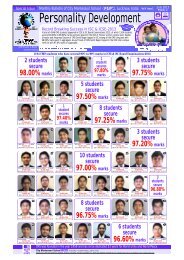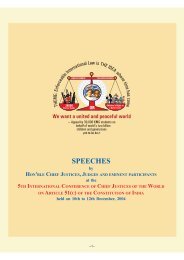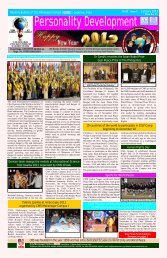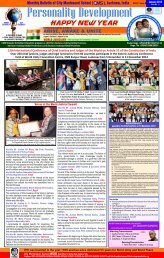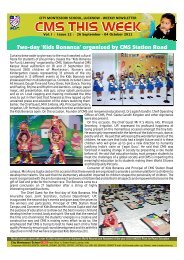PEACE IS THE BY-PRODUCT OF UNITY.contd... from page. 33THE WORLD WILL BE UNITEDTHROUGH THE THREADOF WORLD LAW.(ii) T H E W O R D ' S H ALL' IN ARTICLE <strong>51</strong> OF THECONSTITUTION OF INDIA<strong>Article</strong> <strong>51</strong> <strong>of</strong> <strong>the</strong> <strong>Constitution</strong> <strong>of</strong> <strong>India</strong> states:The State shall endeavour to:(a) promote international peace and security,(b) maintain just and honourable relations between nations,(c) foster respect <strong>for</strong> international law ...; and,(d) encourage settlement <strong>of</strong> international disputes byarbitration.The words “The State shall endeavour” leave no room <strong>for</strong> <strong>the</strong>Government <strong>of</strong> <strong>India</strong> and <strong>the</strong> State Governments to make any choice,o<strong>the</strong>r than <strong>the</strong> endeavour to achieve <strong>the</strong> objectives, <strong>the</strong> purpose and<strong>the</strong> goal <strong>of</strong> <strong>Article</strong> <strong>51</strong> <strong>of</strong> <strong>the</strong> <strong>Constitution</strong> <strong>of</strong> <strong>India</strong>.In <strong>the</strong> a<strong>for</strong>ementioned <strong>Article</strong> <strong>51</strong>, <strong>the</strong> word 'shall' is <strong>the</strong> actualcatchword and is very important, as it binds <strong>the</strong> Government <strong>of</strong> <strong>India</strong>,State Governments and Your Excellency, to achieve <strong>the</strong> goals <strong>of</strong><strong>Article</strong> <strong>51</strong>. Besides its mandatory effect, <strong>the</strong> word 'SHALL', used in<strong>Article</strong> <strong>51</strong> gives strength to it and places on Government <strong>of</strong> <strong>India</strong> andState Governments, a responsibility to make an earnest endeavour toachieve <strong>the</strong> objectives <strong>of</strong> <strong>the</strong> said <strong>Article</strong>. Had it been 'may' or'should', <strong>the</strong> provision would not have been binding, but <strong>the</strong> catchword 'SHALL' denotes that it is <strong>the</strong> duty and obligation <strong>of</strong>Government <strong>of</strong> <strong>India</strong> and State Governments to fulfill it. The makers<strong>of</strong> <strong>the</strong> <strong>Constitution</strong> <strong>of</strong> <strong>India</strong> deliberately used <strong>the</strong> term 'SHALL'. Thesublime spirit <strong>of</strong> <strong>the</strong> <strong>Article</strong> is to achieve international peace andsecurity <strong>for</strong> promoting larger interest <strong>of</strong> <strong>the</strong> society which ispossible only by uniting all <strong>the</strong> nations <strong>of</strong> <strong>the</strong> world in <strong>the</strong> thread <strong>of</strong>En<strong>for</strong>ceable <strong>World</strong> Law.(iii) ARTICLE 31-C, ADDED BY THE CONSTITUTION (25THAMENDMENT) ACT, 1971, SEEKS TO UPGRADE THEDIRECTIVE PRINCIPLES.<strong>Article</strong> 31-C, added by <strong>the</strong> <strong>Constitution</strong> (25th Amendment) Act <strong>of</strong>1971, seeks to upgrade <strong>the</strong> Directive Principles. If laws are made togive effect to <strong>the</strong> Directive Principles over Fundamental Rights, <strong>the</strong>yshall not be invalid on <strong>the</strong> grounds that <strong>the</strong>y take away <strong>the</strong>Fundamental Rights. In case <strong>of</strong> a conflict between FundamentalRights and Directive Principles, if <strong>the</strong> latter aim at promotinglarger interest <strong>of</strong> <strong>the</strong> society, <strong>the</strong> courts will have to uphold <strong>the</strong>case in favour <strong>of</strong> Directive Principles.(iv) RULING OF THE SUPREME COURT IN THE KESAVANANDBHARATI VS. STATE OF KERALA CASE.Fundamental Rights are not absolute and are subject to reasonablerestrictions as necessary <strong>for</strong> <strong>the</strong> protection <strong>of</strong> national interest. In<strong>the</strong> Kesavananda Bharati vs. state <strong>of</strong> Kerala case, <strong>the</strong> Supreme Courtruled that all provisions <strong>of</strong> <strong>the</strong> <strong>Constitution</strong>, including FundamentalRights can be amended. It has ruled in Kesavanand Bharati's casethat 'moral rights' embodied in Part IV are as equally essentialfeature <strong>of</strong> <strong>the</strong> <strong>Constitution</strong> as Fundamental Rights and arefundamental in <strong>the</strong> governance <strong>of</strong> <strong>the</strong> country and all <strong>the</strong> organs <strong>of</strong><strong>the</strong> State are bound to en<strong>for</strong>ce those directions.(v) THE DIRECTIVE PRINCIPLES ACT AS A CHECK ON THEGOVERNMENT; THEORIZED AS A YARDSTICK IN THEHANDS OF THE PEOPLE TO MEASURE THE PERFORMANCEOF THE GOVERNMENT<strong>Article</strong> <strong>51</strong> is included in Part IV <strong>of</strong> <strong>the</strong> <strong>Constitution</strong> <strong>of</strong> <strong>India</strong>. Part IVpertains to Directive Principles <strong>of</strong> State Policy, which are directionsgiven by <strong>the</strong> people <strong>of</strong> <strong>India</strong> in <strong>the</strong> <strong>Constitution</strong> <strong>of</strong> <strong>India</strong> to <strong>the</strong> centraland state governments to nurture and guide <strong>the</strong> establishment <strong>of</strong> ajust society in <strong>the</strong> country and in <strong>the</strong> world. According to <strong>the</strong><strong>Constitution</strong>, <strong>the</strong> government should keep <strong>the</strong>se principles in mindwhile framing laws and planning its activities and actions.The Directive Principles act as a check on <strong>the</strong> government;<strong>the</strong>orized as a yardstick by which people can measure per<strong>for</strong>mance<strong>of</strong> <strong>the</strong> government. <strong>Article</strong> 31-C, added by <strong>the</strong> <strong>Constitution</strong> (25thAmendment) Act, 1971, seeks to upgrade <strong>the</strong> Directive Principles. Iflaws are made to give effect to <strong>the</strong> Directive Principles overFundamental Rights, <strong>the</strong>y shall not be invalid on <strong>the</strong> grounds that<strong>the</strong>y take away <strong>the</strong> Fundamental Rights. In case <strong>of</strong> a conflictbetween Fundamental Rights and Directive Principles, if <strong>the</strong> latteraim at promoting larger interest <strong>of</strong> <strong>the</strong> society, <strong>the</strong> courts willhave to uphold <strong>the</strong> case in favour <strong>of</strong> Directive Principles.WORLD UNITY IS 'PRE-REQUISITE' <strong>for</strong> world peace.An urgent meeting <strong>of</strong> all world leaders at New Delhi without <strong>the</strong>involvement <strong>of</strong> <strong>the</strong> United Nations or its system <strong>of</strong> Veto is <strong>the</strong> FIRST STEP.THE FRUIT OF WORLDPEACE WILL GROW ON THETREE OF WORLD UNITY.IT, THUS, transpires that <strong>Article</strong> <strong>51</strong> <strong>of</strong> <strong>the</strong> <strong>Constitution</strong> <strong>of</strong><strong>India</strong> entails endeavour by <strong>the</strong> State - The Government <strong>of</strong> <strong>India</strong>, topromote international peace and security and such an importantprovision can not be ignored. This <strong>Article</strong> reflects an earnest desire<strong>of</strong> <strong>the</strong> people <strong>of</strong> <strong>India</strong> <strong>for</strong> <strong>World</strong> peace and security by avoiding warsand conflicts in <strong>the</strong> interest <strong>of</strong> entire human race.(1) ASPIRATIONS OF UN GENERAL ASSEMBLY PUT DOWNBY A VETO POWER<strong>Article</strong> <strong>51</strong> acts as a beacon <strong>for</strong> world peace and security andby drawing inspiration <strong>the</strong>refrom we, at our end, are propagating<strong>the</strong> cause. In this connection we wrote to <strong>the</strong> UN Secretary Generalin 1999. The <strong>the</strong>n Secretary-General <strong>of</strong> <strong>the</strong> United Nations Dr K<strong>of</strong>iAnnan in his message <strong>of</strong> 11th October 1999 sent to me said that <strong>the</strong>world's 3 biggest problems were:(a) “It is shocking to think that almost half <strong>of</strong> us – three billion out <strong>of</strong><strong>the</strong> six billion – are entering <strong>the</strong> new era in abject poverty, withless than two dollars a day, or less, to live on. That is one thingwe really must change.”(b) “It is also shocking that people in so many places today areexposed to violence and brutality. The twentieth century hasbeen <strong>the</strong> most murderous in human history. We must make sure<strong>the</strong> twenty-first is more peaceful, and more humane.”(c) “And it is worrying that <strong>the</strong> world's climate seems to bechanging, in a way, which could destroy <strong>the</strong> homes andlivelihood <strong>of</strong> millions. Controlling and managing this processmay yet prove to be <strong>the</strong> biggest challenge <strong>of</strong> all.”In this regard, Dr K<strong>of</strong>i Annan fur<strong>the</strong>r said:(d) “People all over <strong>the</strong> world look to <strong>the</strong> United Nations to protect<strong>the</strong>m – from hunger, disease and violence, and natural disasters –whenever <strong>the</strong> task seems too big <strong>for</strong> nations, or regions, to handlealone. But we at <strong>the</strong> United Nations can do nothing alone, ei<strong>the</strong>r.Our strength is <strong>the</strong> strength <strong>of</strong> our member states, when <strong>the</strong>yagree to act toge<strong>the</strong>r <strong>for</strong> <strong>the</strong> common good.”(e) “Next year, leaders from all over <strong>the</strong> world will come to New York<strong>for</strong> <strong>the</strong> Millennium Summit. They will consider <strong>the</strong> challengesahead, and what <strong>the</strong> United Nations can do to face <strong>the</strong>m. Thoseleaders will be representing you, <strong>the</strong> peoples <strong>of</strong> <strong>the</strong> UnitedNations. It is up to you to make sure that <strong>the</strong>y come here firmlyresolved to take decisions which can lead to a better life <strong>for</strong> all <strong>of</strong>us, and <strong>for</strong> our children.”Conveying his good wishes to CMS Dr. K<strong>of</strong>i Annan stated that "Iam counting on you all." Accordingly, I wrote to all Heads <strong>of</strong> Stateand Heads <strong>of</strong> Government to take positive actions at <strong>the</strong>Millennium Summit.However, <strong>the</strong> leaders <strong>of</strong> <strong>the</strong> nations <strong>of</strong> <strong>the</strong> world attending <strong>the</strong>Millennium Summit were not even given an opportunity to discussor consult on any issue relating to <strong>the</strong> <strong>for</strong>mation <strong>of</strong> a "newinternational political and economic order <strong>of</strong> <strong>the</strong> world" which was(1) General Consensus <strong>of</strong> <strong>the</strong> 53rd Session <strong>of</strong> <strong>the</strong> U.N. GeneralAssembly dated 10th May 1999 and (2) which was also <strong>the</strong>Declaration <strong>of</strong> <strong>the</strong> UN Millennium Forum which was held from 22ndto 26th May 2000. But this issue did not find place in <strong>the</strong> agenda <strong>of</strong><strong>the</strong> Millennium Summit at <strong>the</strong> instance <strong>of</strong> a Veto Power.This short-sighted and unthoughtful action <strong>of</strong> <strong>the</strong> Veto Power hurtme badly and because <strong>of</strong> this I decided to approach <strong>the</strong> <strong>World</strong>Judiciary, which I think is <strong>the</strong> last hope <strong>of</strong> humanity's survival andstarted organizing International Conferences <strong>of</strong> Chief Justices <strong>of</strong><strong>the</strong> <strong>World</strong> (<strong>World</strong> Judiciary Summits) on <strong>Article</strong> <strong>51</strong> <strong>of</strong> <strong>the</strong><strong>Constitution</strong> <strong>of</strong> <strong>India</strong> <strong>for</strong> Uniting <strong>the</strong> <strong>World</strong> in order to establish <strong>the</strong>rule <strong>of</strong> law in <strong>the</strong> world.(2) ALEGACYOFWARS,VIOLENCE,DESTRUCTIONANDDEATHSince <strong>the</strong> Second <strong>World</strong> War, 199 wars have been fought by 81countries and 69 countries have been <strong>the</strong> <strong>the</strong>atres <strong>of</strong> war (Mr JanezStanovnik, Paris, UNESCO, 1978) . Mr Gil Elliot, who made a valiantattempt to count <strong>the</strong> man-made deaths in 20th century, has foundout that a total <strong>of</strong> 110 million people died between 1900 and 1970.This figure includes 38 million soldiers. It means that one out <strong>of</strong>every 30 inhabitants on earth was killed through governmentcriminality (pages 43-44,' Victims <strong>of</strong> Politics : The State and HumanRights' by K. Glaser and S. T. Possony, New York, ColumbiaUniversity Press, 1979).VIOLENCE: Resolve confliction in such a way that every body wins and no one loses.contd... on page 3534
PEACE IS THE BY-PRODUCT OF UNITY.contd... from page 34THE WORLD WILL BE UNITEDTHROUGH THE THREADOF WORLD LAW.After 1970 <strong>the</strong>re have been more deaths in wars in Middle Eastand African countries. <strong>India</strong> was no exception, as it has beenattacked several times and is subject to cross-border terrorism inwhich thousands have been killed. Terrorist attacks on <strong>World</strong> TradeCentre, New York, on 11th September 2001, and subsequently,bombing to contain terrorism in Afghanistan have resulted inkillings <strong>of</strong> a large number <strong>of</strong> people, including women and children.We are also witness to <strong>the</strong> war in Iraq and also <strong>of</strong> subsequentkillings by suicide squads. Thousands have been killed or maimed.Use <strong>of</strong> depleted uranium dust on missile warheads will havedevastating effect not only on <strong>the</strong> victims but also on futuregenerations. Stockpiling <strong>of</strong> a large number <strong>of</strong> nuclear armaments,chemical and biological weapons and degradation <strong>of</strong> ecology andenvironment have created a situation in which future <strong>of</strong> children isnot safe. Children <strong>the</strong> world all over are living in appallingconditions. If huge resources spent on armaments are committed to<strong>the</strong>ir welfare instead, <strong>the</strong> world would become a different place.(3) ARTICLE <strong>51</strong> AS A BEACON OF HOPE FOR HUMANITYIn such world scenario, <strong>the</strong> spirit enshrined in <strong>the</strong> provisions <strong>of</strong><strong>Article</strong> <strong>51</strong> <strong>of</strong> <strong>the</strong> <strong>Constitution</strong> <strong>of</strong> <strong>India</strong> acts as a beacon <strong>of</strong> hope.Itreflects an earnest desire <strong>of</strong> <strong>the</strong> people <strong>of</strong> <strong>India</strong> <strong>for</strong> world peace andsecurity by avoiding conflicts and wars in <strong>the</strong> interest <strong>of</strong> entire humanrace. The development <strong>of</strong> science, technology, transport,communication and in<strong>for</strong>mation technology, expansion <strong>of</strong>international trade and commerce have brought <strong>the</strong> world toge<strong>the</strong>r asa 'global village'. All <strong>the</strong>se developments call <strong>for</strong> a new world orderwhich is possible only by maintenance <strong>of</strong> world peace and security asenvisaged in <strong>Article</strong> <strong>51</strong> <strong>of</strong> <strong>the</strong> <strong>Constitution</strong> <strong>of</strong> <strong>India</strong>.(4) The present problems <strong>of</strong> <strong>the</strong> world, like <strong>the</strong> huge stockpile <strong>of</strong>nuclear armaments, capable <strong>of</strong> devastating <strong>the</strong> entire world severaltimes, dangers <strong>of</strong> low and high intensity wars among nations,terrorism (including cross-border terrorism), boundary-disputes,ethnic disputes, economic and political problems, environmentaldegradation, pollution, problems <strong>of</strong> disputes based on religion, etc.,which affect <strong>the</strong> entire humanity, can be solved only by a rationalview and awareness, taking into account <strong>the</strong> enormity <strong>of</strong> <strong>the</strong>present situations and by creating an impartial world body, wi<strong>the</strong>nough legal powers to implement its directives and decisions <strong>for</strong><strong>the</strong> welfare <strong>of</strong> <strong>the</strong> entire society. The said <strong>Article</strong> <strong>51</strong> gives a newvision and such provisions should not only be adopted by all nationsin <strong>the</strong>ir respective constitutions but every nation must also adhereto those provisions, in both spirit and action and in dealings witho<strong>the</strong>r countries.(5) THE PHILOSOPHY OF 'VASUDHAIV KUTUMBAKAM'AND ARTICLE <strong>51</strong> OF THE CONSTITUTION OF INDIAFrom ancient times <strong>India</strong>n philosophy and vision seeks to bringhumankind to <strong>the</strong> path <strong>of</strong> peace, cooperation, co-existence, nonviolence,human dignity and human advancement. <strong>India</strong> believes inuniversality <strong>of</strong> mankind as one human family (VasudhaivKutumbakam) . The provisions <strong>of</strong> <strong>Article</strong> <strong>51</strong> <strong>of</strong> <strong>the</strong> <strong>Constitution</strong> <strong>of</strong><strong>India</strong> embodies an affirmation <strong>of</strong> that philosophy and ideals. Thepromotion <strong>of</strong> international peace and security as a constitutionaldirective is a declaration made by <strong>the</strong> people <strong>of</strong> <strong>India</strong> not only <strong>for</strong><strong>the</strong> welfare <strong>of</strong> <strong>India</strong>n society but indeed <strong>for</strong> <strong>the</strong> welfare <strong>of</strong>humanity at large. For every declaration that affects Internationallife and International relations, is a declaration made <strong>for</strong> <strong>the</strong>welfare <strong>of</strong> entire world.(6) The vision given by <strong>Article</strong> <strong>51</strong> <strong>of</strong> <strong>the</strong> <strong>Constitution</strong> <strong>of</strong> <strong>India</strong> <strong>for</strong>international peace and security also enjoins us all in its clause (c)to strive to foster 'respect <strong>for</strong> international law'. But one can haverespect <strong>for</strong> international law if it is based on justice and equalityand is enacted by a duly constituted world body having universalsanction and which is en<strong>for</strong>ceable on all peoples and nation states.The present 'so called' international law has no universal sanctionand is not en<strong>for</strong>ceable and, <strong>the</strong>re<strong>for</strong>e, it has proved to be inadequatein as much as it has not been able to solve problems. The result hasbeen that big and powerful nations, by violent intimidation andimposing sanctions, have only brought misery, hunger, disease andpoverty to more people, many problems remain unsolved and aresometimes aggravated.(7) ARTICLE <strong>51</strong> ENJOINS RESPECT FOR INTERNATIONAL LAWIt is obvious <strong>the</strong>re<strong>for</strong>e, that <strong>the</strong> provisions <strong>of</strong> <strong>Article</strong> <strong>51</strong> <strong>of</strong> <strong>the</strong><strong>Constitution</strong> <strong>of</strong> <strong>India</strong> are unique provisions propounding a great<strong>India</strong>n philosophy. They create an awareness and <strong>the</strong>y act as abeacon <strong>of</strong> hope <strong>for</strong> <strong>the</strong> promotion <strong>of</strong> international peace andsecurity. They serve as a guideline <strong>for</strong> framing international lawbased on justice, equality, co-existence and human dignity in thisWORLD UNITY IS 'PRE-REQUISITE' <strong>for</strong> world peace.An urgent meeting <strong>of</strong> all world leaders at New Delhi without <strong>the</strong>involvement <strong>of</strong> <strong>the</strong> United Nations or its system <strong>of</strong> Veto is <strong>the</strong> FIRST STEP.We need to have a new consultative approach to resolve conflict.THE FRUIT OF WORLDPEACE WILL GROW ON THETREE OF WORLD UNITY.strife-torn world <strong>for</strong> <strong>the</strong> ultimate objective <strong>of</strong> human advancement.Clause(c) <strong>of</strong> <strong>the</strong> <strong>Article</strong> enjoins <strong>the</strong> state 'to foster respect <strong>for</strong>international law' . It also follows that international or world lawhas to have universal sanction. It needs to be applicable to allcountries and peoples <strong>of</strong> <strong>the</strong> world and it must be en<strong>for</strong>ceable. Inorder to en<strong>for</strong>ce obedience to such a law, <strong>the</strong>re has to be anexecutive authority and world judiciary to decide on disputes and<strong>for</strong> <strong>the</strong> interpretation <strong>of</strong> such laws. “Laws not en<strong>for</strong>ced cease to belaws and rights not defended may wi<strong>the</strong>r away” DirectivePrinciples <strong>for</strong> People Welfare(Thomas Moriarty) .(8) DIRECTIVE PRINCIPLES FOR PEOPLE'S WELFAREAs per <strong>the</strong> decision <strong>of</strong> <strong>the</strong> Supreme Court <strong>of</strong> <strong>India</strong> in <strong>the</strong>Kesavanand Bharati v/s State <strong>of</strong> Kerala case and in <strong>the</strong> context <strong>of</strong><strong>Article</strong> 31-C, <strong>the</strong> Directive Principles <strong>of</strong> State Policy are in <strong>the</strong> widerinterest <strong>of</strong> <strong>the</strong> people <strong>of</strong> <strong>India</strong> and <strong>the</strong>re<strong>for</strong>e, if <strong>the</strong> need so arises, <strong>the</strong>same may override <strong>the</strong> fundamental rights granted to <strong>the</strong> citizens in<strong>the</strong> <strong>Constitution</strong> <strong>of</strong> <strong>India</strong>. It is in this context that we mustunderstand <strong>the</strong> importance <strong>of</strong> <strong>Article</strong> <strong>51</strong> <strong>of</strong> <strong>the</strong> <strong>Constitution</strong> <strong>of</strong> <strong>India</strong>.The directive principles <strong>of</strong> state policy enjoin upon <strong>the</strong> Government<strong>of</strong> <strong>India</strong> to implement <strong>the</strong>m in letter and spirit as <strong>the</strong>y serve <strong>the</strong>interests <strong>of</strong> <strong>the</strong> people <strong>of</strong> <strong>India</strong>. There<strong>for</strong>e, <strong>the</strong> courts should uphold<strong>the</strong> sanctity <strong>of</strong> <strong>Article</strong> <strong>51</strong> as it does in case <strong>of</strong> <strong>the</strong> fundamental rights<strong>of</strong> <strong>the</strong> <strong>India</strong>n citizens. There<strong>for</strong>e, <strong>the</strong> Government <strong>of</strong> <strong>India</strong> mustimplement all <strong>the</strong> provisions laid down in <strong>the</strong> directive principles <strong>of</strong>state policy including <strong>Article</strong> <strong>51</strong> since it seeks <strong>the</strong> good and <strong>the</strong>welfare <strong>of</strong> <strong>the</strong> people. Not only <strong>the</strong> government <strong>of</strong> <strong>India</strong> but also all<strong>the</strong> state governments should accept <strong>the</strong>m as <strong>the</strong> source <strong>of</strong> itswelfare policies. <strong>Article</strong> <strong>51</strong> is one <strong>of</strong> <strong>the</strong> most important provisionslaid down in <strong>the</strong> directive principles <strong>of</strong> <strong>the</strong> state policy.(9) The City Montessori School has raised a lone voice not to keeparticle <strong>51</strong> in abeyance any longer. When we say this, we do notmean to attribute any fault to <strong>the</strong> government <strong>of</strong> <strong>India</strong> or to <strong>the</strong>governments <strong>of</strong> <strong>the</strong> states. The real purpose <strong>of</strong> drawing attention to<strong>Article</strong> <strong>51</strong> is to appeal to both central and state governments toimplement its provisions because <strong>the</strong>y seek <strong>the</strong> larger interests <strong>of</strong><strong>the</strong> people <strong>of</strong> <strong>India</strong>. Almost a decade ago <strong>the</strong> City MontessoriSchool convened <strong>the</strong> First Conference <strong>of</strong> Chief Justices <strong>of</strong> <strong>the</strong> <strong>World</strong>to see if <strong>Article</strong> <strong>51</strong> could serve <strong>the</strong> larger interests <strong>of</strong> <strong>the</strong> people. Theconference came to <strong>the</strong> conclusion that <strong>Article</strong> <strong>51</strong> would very wellserve <strong>the</strong> interests <strong>of</strong> <strong>the</strong> people <strong>of</strong> <strong>India</strong> and <strong>of</strong> <strong>the</strong> world. On <strong>the</strong>contrary <strong>the</strong> people <strong>of</strong> <strong>India</strong> would stand to lose if <strong>the</strong> provisions <strong>of</strong><strong>Article</strong> <strong>51</strong> were not implemented according to its spirit.(10) Every citizen <strong>of</strong> <strong>the</strong> world is deeply concerned about <strong>the</strong> evergrowing threat <strong>of</strong> nuclear weapons. A slight provocation on <strong>the</strong> part<strong>of</strong> a thoughtless ruler may ignite <strong>the</strong> whole world into flames <strong>of</strong> anuclear holocaust. There<strong>for</strong>e, it is imperative to establish peace andharmony among nations. However, establishment <strong>of</strong> temporarypeace would not be enough to prevent a nuclear war in <strong>the</strong> event <strong>of</strong>a conflict. There<strong>for</strong>e, it is essential that <strong>the</strong> whole world shouldunite under one world government. <strong>Article</strong> <strong>51</strong> <strong>of</strong> <strong>the</strong> <strong>Constitution</strong> <strong>of</strong><strong>India</strong> provides enough food <strong>for</strong> thought to <strong>for</strong>m a world governmentand hence City Montessori School is stressing upon <strong>the</strong>implementation <strong>of</strong> its provisions not only in <strong>the</strong> <strong>India</strong>n context butin <strong>the</strong> wider context <strong>of</strong> <strong>the</strong> whole world. We believe that even <strong>the</strong>veto powers will appreciate <strong>the</strong> relevance <strong>of</strong> <strong>Article</strong> <strong>51</strong> in <strong>the</strong><strong>Constitution</strong> <strong>of</strong> <strong>India</strong> because it has <strong>the</strong> power to unite entirehumanity and to convince it <strong>for</strong> <strong>the</strong> <strong>for</strong>mation <strong>of</strong> a worldgovernment, if humanity is to be saved from <strong>the</strong> catastrophe <strong>of</strong> apossible nuclear war.(11) Many problems have cropped up around <strong>the</strong> world due to <strong>the</strong>thoughtless actions <strong>of</strong> some leaders who are at <strong>the</strong> helm <strong>of</strong> affairs in<strong>the</strong>ir respective countries. A united world will ignore such vestedinterests that are out to destroy this beautiful planet <strong>for</strong> serving<strong>the</strong>ir own selfish ambitions. A world government will not allowsuch crazy people to resort to mischiefs that are harmful to <strong>the</strong> unity<strong>of</strong> mankind. <strong>Article</strong> <strong>51</strong> <strong>of</strong> <strong>the</strong> <strong>Constitution</strong> <strong>of</strong> <strong>India</strong> is thus is an idealmodel <strong>of</strong> human unity and that is <strong>the</strong> reason why we have beenorganizing <strong>the</strong> International Conferences <strong>of</strong> Chief Justices <strong>of</strong> <strong>the</strong><strong>World</strong> every year in <strong>the</strong> month <strong>of</strong> December in Lucknow, <strong>India</strong>.Victor Hugo said: “There is one thing stronger than all <strong>the</strong> armiesin <strong>the</strong> world and that is an idea whose time has come.” Jan Tinbergen,Nobel laureate said: “Mankind's problems can no longer be solved bynational governments. What is needed is a <strong>World</strong> Government. This canbest be achieved by streng<strong>the</strong>ning <strong>the</strong> United Nations system.” Webelieve that this is <strong>the</strong> idea whose time has come.contd... on page 3635


